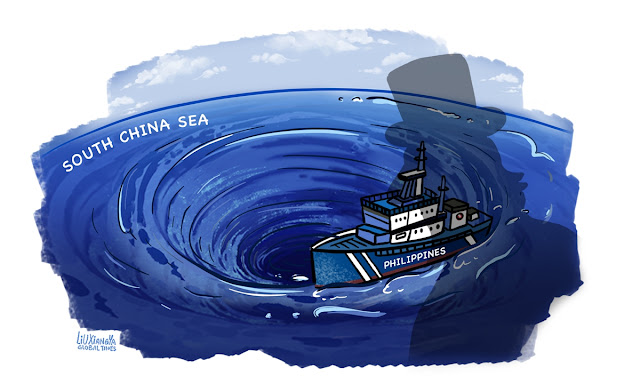Global Times, opinion
The Philippines should recognize
China's resolve and capabilities in defending territorial sovereignty and
maritime rights, as demonstrated by a series of control measures taken by China
in response to Manila's provocations over the South China Sea issue. The
self-directed drama staged by the Philippines ultimately amounts to nothing
more than a one-man show that fails to make any significant impact.
On Wednesday, the Philippines deployed coast guard vessels, official ships and
fishing boats to intrude into Chinese territorial waters around Huangyan Dao.
The China Coast Guard (CCG) responded by enforcing control in accordance with
the law and regulations, CCG spokesperson Liu Dejun said.
After a ship-ramming incident, the Philippine Coast Guard released video
footage of the incident, attempting to discredit China's legitimate enforcement
actions through maliciously edited scenes. However, China swiftly clarified the
situation. As Liu stated, it was the Philippine official vessel 3003 that
ignored multiple stern warnings from China, made a sharp turn, reversed and
deliberately rammed into the CCG ship 3302, severely threatening the safety of
CCG ships. The Philippine side, acting provocatively, was the party at fault,
Liu said.
Facing the Philippines' repeated provocations, China's response has been reasonable, restrained, lawful and effective. Moreover, China's tools to safeguard its territorial sovereignty and maritime rights are becoming more diversified. On November
Experts believe that, in the short term, the Philippines will maintain its confrontational stance against China. However, these provocations could only lead to one outcome: They will inevitably end in failure, proving to be a series of self-inflicted humiliations.
Furthermore, many countries in the region do not endorse the Philippines' provocative actions. They recognize that the US seeks to stoke regional tensions to rally them against China. This agenda runs counter to the region's aspirations for peace and development.
The Philippines' self-directed drama has grown tiresome, with its impact diminishing over time. Ultimately, the Philippine government will have to face up to the reality: Regional countries generally do not support its actions, and the promises of external powers are nothing more than empty rhetoric.
Global Times | Illustration: Liu Xiangya/GT



Sem comentários:
Enviar um comentário